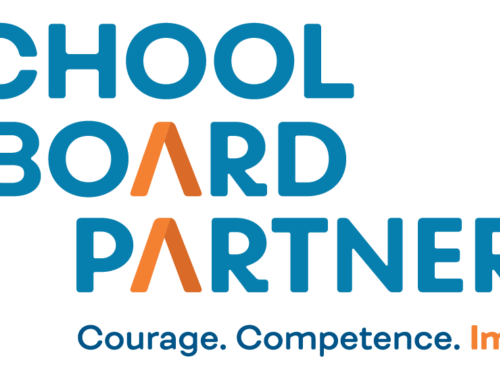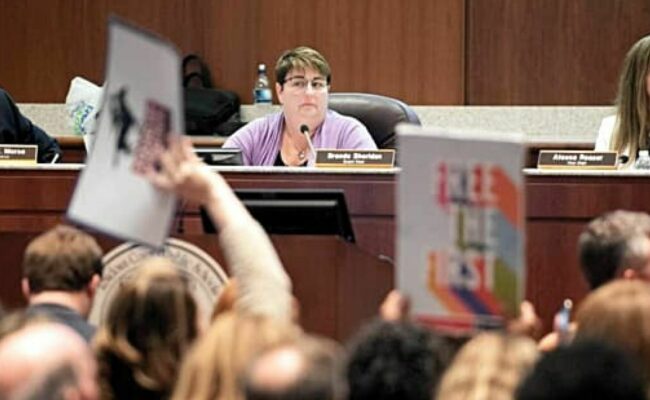Should schools reopen? Should students wear masks? Should vaccines be mandated? Should online learning continue to be a robust option? Does our district teach critical race theory?
School boards have been in the news more this past year than ever before. More and more of the decisions impacting our world are in the hands of school board members, but the reality is this: Our nation’s school boards are in crisis. Some might go so far as to state that school boards are broken, but the truth is they are operating exactly as they were designed. School boards were never set up to oversee school systems that adequately serve all students, and that fact is finally becoming glaringly obvious. The good news is that better school board governance is possible. The question is, will we do anything about it, or will we let local school boards become as dysfunctional as national politics and watch our kids suffer because of it?
School Board Partners is a national network of 53 diverse school board members from 41 cities representing over 3.9M students. We want things to change and know that they can.
For nearly 100 years, school boards have been an integral feature of the U.S. public education system. Arguably, school board members have more impact on the daily lives of students and their families than any other elected officials, yet we are the least professionalized. School boards select and manage the superintendent and determine the goals and priorities of the district. We allocate resources and approve the budget, quite literally deciding which neighborhoods, which students, and which programs get more or less funding, altering lives with our decisions. We approve curriculum, and therefore decide matters such as whether students are taught the accurate history of our country and whether districts use a reading curriculum that actually works.
And now we are fighting a culture war and making front-line health and safety decisions in the midst of the worst international pandemic in 100 years.
But despite playing such an outsized role in people’s lives, school boards operate with fewer resources than any other elected position, on average. Compared to members of the city council, county commissioners, and state and federal representatives, school board members are paid the least (often nothing), have the smallest number of staff (usually zero), and receive almost no training or support once elected (other than how to maintain the status quo and not be sued).
One result is that school boards don’t reflect the students they serve. In fact, school boards are substantially whiter, older, wealthier, and more male than the constituents they serve. While about half of public school students are white, 78% of school board members are white, followed by a mere 10% African American/Black and 3% Hispanic or Latino.
Another result is that school boards typically lack the knowledge and skills to expertly govern institutions that are one of the largest employers, transportation companies, purchasers, and real estate owners in a community. And now we are being co-opted to fight cultural and political wars that are distracting us from our primary job: ensuring that every student under our care receives a free, equal, and high-quality education that prepares them to be a thriving member of our communities and country – especially those students who depend on public schools the most.
So what is the answer? We believe it is fourfold.
WE MUST PASS STATE LAWS TO PAY SCHOOL BOARD MEMBERS A LIVING WAGE.
A 2018 report from the National School Boards Association showed 61% of board members nationally receive no pay. Wealthy retired school board members might be able to volunteer, but a single parent working a low-wage job needs to be able to make a living wage as a school board member — only then, will we have local boards that reflect the communities they represent. One such example can be seen in Los Angeles, where after years of fighting for higher-quality schools, better jobs, and more pay, the board secured historic funding for education in the 2017 state budget that allowed a 174% increase in member salaries.
STATE LAWS NEED TO REQUIRE SUBSTANTIAL TRAINING FOR SCHOOL BOARD MEMBERS ON EVERYTHING FROM BOARD GOVERNANCE AND COMMUNICATIONS TO FINANCE AND EXECUTIVE MANAGEMENT TO POLICY WRITING AND COMMUNITY ENGAGEMENT – ALL WITH A FOCUS ON EQUITY.
Just as our federal government relies on three branches with relatively equal power and checks and balances, we’ve seen that school districts operate best with two branches of equal power – the superintendent and the school board. The superintendent gains power through a career in education and a full-time job and staff. As volunteers stewarding public education on behalf of a community, school board members often reflect a wide range of occupations and experiences, and therefore, must build knowledge and power through training and support once elected. Without the right tools, guidance, and power, school boards cannot effectively hold the superintendent accountable for closing the opportunity and experience gaps that too many students currently experience. And without training on good governance, boards can use their power inappropriately to micromanage superintendents and staff and politicize the role.
WE MUST PROFESSIONALIZE SCHOOL BOARDS.
That means changing the norm for staffing and resources. Every school board member in a large district should have at least one staff person to help them with the myriad of tasks they’re expected to perform, including community forums, social media and communications, budget analysis, policy writing, data analysis, superintendent evaluation, and more. We should have resources for training and professional development, based on which skills we bring to the job and which skills we lack experience in prior to being elected.
All of this would cost just a tiny fraction of the funding currently spent on public education, which is failing millions of children and families a year.
WE MUST DE-POLITICIZE SCHOOL BOARDS, WHICH IS SOMETHING THAT ONLY INDIVIDUAL COMMUNITY MEMBERS CAN CHANGE.
As a citizen, you must use your voice to demand that your board focuses on key issues such as diverse, high-quality school options for all families, budget and data transparency for communities, research-based professional development for staff and curriculum for students, sufficient mental health services, and access to arts and extracurriculars. Please stop showing up at meetings to give public comment on masks mandates – we must and will make public health decisions based on recommendations by public health experts. Please stop commenting on fake, over-politicized issues such as critical race theory. This only distracts us from the essential work of overcoming pandemic learning loss and preparing students for an ever more complicated world.
There is no shortage of issues, arguments, or sides when it comes to our education system, and that’s not likely to change. But most parents can agree on one thing – they want their children to receive an excellent education. Let’s not only demand but equip our local school board members to lead that so that one day, our country can finally deliver its promise of the American dream to all.
Written By Ethan Ashley and Carrie McPherson Douglass, School Board Partners Co-Founders/CEOs

Related Blog Entries

Managing Climate Crises: Resources for School Boards
April 17, 2024
Ethan Ashley
Read More About Managing Climate Crises: Resources for School Boards



